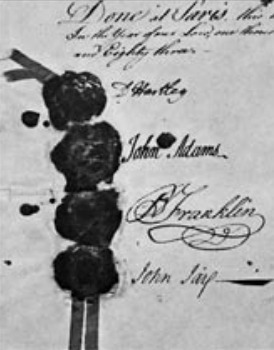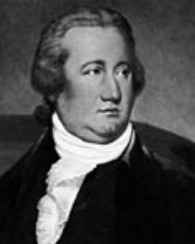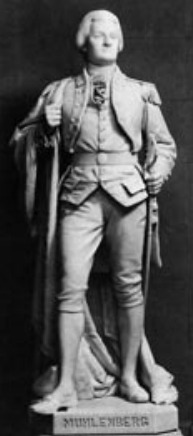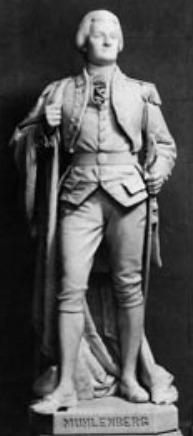David Barton's Blog
August 25, 2010
The pledge of Allegiance by David Barton
As previously noted, the Court's standard for what
constitutes an unconstitutional religious activity had grown increasingly more
narrow and restrictive from case to case; the Weisman case proved no exception.
In it, the Court introduced a new test for constitutionality: the
"psychological coercion test." Under this test, if a single individual finds
him uncomfortable in the presence of a religious practice in public, then that
activity is unconstitutional. The Court alleged that the unconstitutional
"psychological coercion" had occurred when the crowd stood for Rabbi
Gutterman's prayer:
What to most believers may seem nothing more than a
reasonable request that the nonbeliever respect their religious practices, in a
school context may appear to the nonbeliever or dissenter to be an attempt to
employ the machinery of the State to enforce a religious orthodoxy? The
undeniable fact is that the school district's supervision and control of a high
school graduation ceremony place public pressure, as well as peer pressure, on
attending students to stand as a group or, at least, maintain respectful
silence during the Invocation and Benediction. The dissent vehemently objected
to this new test:
As its instrument of destruction, the bulldozer of its
social engineering, the Court invents a boundless, and boundlessly manipulable,
test of psychological coercion. The opinion manifests that the Court itself has
not given careful consideration to its test of psychological coercion. For if
it had, how could it observe, with no hint of concern of disapproval, that
students stood for the pledge of Allegiance, which immediately preceded Rabbi
Gutterman's invocation? .
Since the Pledge of Allegiance included the phrase "under
God," recital of the Pledge would appear to raise the same Establishment Clause
issue as the invocation and benediction. If students were psychologically
coerced to remain standing during the invocation, they must also have been
psychologically coerced, moments before, to stand for and thereby, in the Court's
view, take part in or appear to take part in the Pledge.
August 18, 2010
The Kentucky Statute by David Barton
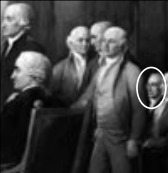
A carving of Moses holding the Ten Commandments, if that is
the only adornment on a courtroom wall, conveys an equivocal unclear and
uncertain message, perhaps a respect for Judaism, for religion in general, or
for law. It was striking that in Stone the Supreme Court completely ignored the
facts which led both the Kentucky legislature and the federal district court to
acknowledge the secular importance of the Ten Commandments. This unprecedented
rejection of fact by the Court drew sharp criticism from Justice Rehnquist in
his dissent:
The Court concludes that the Kentucky statute involved in
this case "has no secular legislative purpose," and that "the preeminent purpose
for posting the Ten Commandments on schoolroom walls is plainly religious in
nature." This even though, as the trial court found, "the General Assembly
thought the statute had a secular legislative purpose and specifically said
so." The Court's summary rejection of a secular purpose articulated by the
legislature and confirmed by the State court is without precedent in
Establishment Clause jurisprudence. This Court regularly looks to legislative
articulations of a statute's purpose in Establishment Clause cases. The Court
rejects the secular purpose articulated by the State because the Decalogue is
"undeniably a sacred text." It is equally undeniable, however, as the elected
representatives of Kentucky determined, that the Ten Commandments have had a
significant impact on the development of secular legal codes of the Western
World. The trial court also concluded that evidence submitted substantiated
this determination.
Certainly the State was permitted to conclude that a
document with such secular significance should be placed before its students,
with an appropriate statement of the document's secular import. Almost as
amazing as the Court's claim that the Ten Commandments lacked secular purpose
was the Court's complaint of what would occur if students were to view the
Commandments:
If the posted copies of the Ten Commandments are to have
any effect at all, it will be to induce the schoolchildren to read, meditate upon,
perhaps to venerate and obey, the Commandments. The Court therefore concluded:
This is not a permissible state objective under the
Establishment Clause. The mere posting of the copies the Establishment Clause
prohibits. The Founding Fathers would have disagreed vehemently.
August 17, 2010
The Alabama State legislature by David Barton
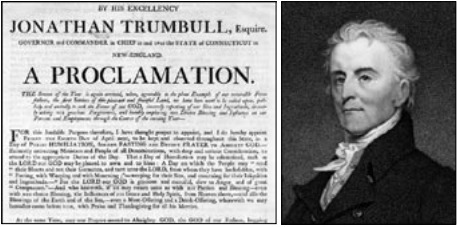
The Alabama State legislature had simply permitted a
voluntary, silent activity; the Court concluded that this was the equivalent of
encouraging a religious activity and was thus an impermissible establishment of
religion. Ironically, Alabama came under the provisions of the U. S.
territorial ordinance which had declared that:
Religion, morality, and knowledge, being necessary to
good government and the happiness of mankind, schools and the means of education
shall forever be encouraged. The Founders thought it proper for the government
to promote religious activities. In fact, they frequently encouraged such activities.
For example emphasis added in each quote:
Sensible of the importance of Christian piety and virtue
to the order and happiness of a state, I cannot but earnestly commend to you
every measure for their support and encouragement. The very existence of the
republics depends much upon the public institutions of religion. John Hancock
A free government can only be happy when the public
principle and opinions are properly directed by religion and education. It
should therefore be among the first objects of those who wish well to the
national prosperity to encourage and support the principles of religion and
morality. Abraham Baldwin, Signer of the Constitution
The promulgation of the great doctrines of religion, the
being, and attributes, and providence of one Almighty God; the responsibility to
Him for all our actions, founded upon moral accountability; a future state of
rewards and punishments; the cultivation of all the personal, social, and
benevolent virtues; these never can be a matter of indifference in any
well-ordered community. It is indeed difficult to conceive how any civilized
society can well exist without them. Joseph Story, U.S. Supreme Court Justice;
Father of American Jurisprudence
To promote true religion is the best and most effectual
way of making a virtuous and regular people. Love to God and love to man is the
substance of religion; when these prevail, civil laws will have little to do.
The magistrate or ruling part of any society ought to encourage piety and make
it an object of public esteem.
August 9, 2010
The constitutional wall of separation by David Barton
One further note from this decision: a concurring Justice
observed that, through this ruling, the Court was now assuming "the role of a
super board of education for every school district in the nation" an ominous
prediction of what has now become the norm. Engel v. Vitale, 1962
For fourteen years following the McCollum case, the Court
not only ceased to strike down voluntary religious activities for students, it
actually upheld them, retreating significantly from its inflexible concept of
"separation" introduced in 1947 in Everson see Zorach v. Clauson, 1952 21.
However, in the Engel case, the Court reverted to its Everson position; it
attacked the long-standing tradition of school prayer and struck down this
simple 22-word prayer from New York schools:
Almighty God, we acknowledge our dependence upon Thee, and
we beg Thy blessings upon us, our parents, our teachers and our Country.
Contemporary reviewers often claim that the "real" issue in this prayer case
was coercion since it involved a state approved prayer. Yet this is a misportrayal;
there was no coercion; even the Court conceded that the schools did not compel
any pupil to join in the prayer over his or her parents' objection.
New York had taken great pains to provide that
participation in these prayers be completely voluntary. Furthermore, in an
attempt to be as inoffensive as possible, the prayer's wording was simply a
nonsectarian acknowledgment of God. In fact, that acknowledgment was so bland
that a later court described it "as a 'to-whom-it-may-concern' prayer." Since
the prayer was both voluntary and nondenominational, it should have been
upheld; yet the Court explained why it must be struck down: Neither the fact
that the prayer may be denominationally neutral nor the fact that its
observance on the part of the students is voluntary can serve to free it from
the limitations of the Establishment Clause, as it might from the Free Exercise
Clause, of the First Amendment. It ignores the essential nature of the
program's constitutional defects. Prayer in its public school system breaches
the constitutional wall of separation between Church and State.
August 2, 2010
The Divine Spirit by David Barton
And as my children will have frequent occasion of
perusing this instrument and may probably be particularly impressed with the
last words of their father, I think it proper here not only to subscribe to the
entire belief of the great and leading doctrines of the Christian religion,
such as the being of God, the universal defection and depravity of human nature,
the divinity of the person and the completeness of the redemption purchased by
the blessed Savior, the necessity of the operations of the Divine Spirit; of
Divine faith accompanied with an habitual virtuous life, and the universality
of the Divine Providence: but also, in the bowels of a father's affection, to
exhort and charge them that the fear of God is the beginning of wisdom, that
the way of life held up in the Christian system is calculated for the most
complete happiness that can be enjoyed in this mortal state. Richard Stockton,
Signer of the Declaration
These wills, and others like them, represent the tone of
what was common among the Founders. Additionally, the personal writings of many
other Founders reflect equally succinct declarations about their faith in
Christ. Consider a few examples:
My hopes of a future life are all founded upon the Gospel
of Christ and I cannot cavil or quibble away evade or object to the whole tenor
of His conduct by which He sometimes positively asserted and at others
countenances permits His disciples in asserting that He was God. John Quincy
Adams
Now to the triune God, The Father, the Son, and the Holy
Ghost, be ascribed all honor and dominion, forevermore Amen. Gunning Bedford,
Signer of the Constitution
The religion I have is to love and fear God, believe in
Jesus Christ, do all the good to my neighbor, and myself that I can, do as
little harm as I can help, and trust on God's mercy for the rest. Daniel Boone,
Revolutionary Officer; Legislator
July 29, 2010
The Religious Nature of the Founding Fathers by David Barton
If the Founders were generally men of faith, then it is
illogical to believe that they would establish public policies either to
prohibit or to inhibit expressions of the faith they cherished. On the other
hand, if the contemporary portrayal is correct, and if as many now claims the
Founders were by and large a collective group of atheists, agnostics, and
deists, then it is logical that they would not want religious activities as a
part of official public life. Therefore, a vital question to be answered in the
current debate over the historical and constitutional role of public religious
expressions is, "What was the overall religious disposition of the Founding
Fathers?"
Before delving into an investigation of their religious
nature, it is important first to establish what constitutes a "Founding
Father." As previously noted in the preface, for the purpose of this work, a
"Founding Father" is one who exerted significant influence in, provided
prominent leadership for, or had a substantial impact upon the birth,
development, and establishment of America as an independent, self-governing
nation. This obviously includes the fifty-six signers of the Declaration of
Independence, as well as the fourteen different Presidents who governed America
from 1774 to 1789. Under America's unicameral system prior to the Constitution,
the President of the Continental Congress essentially served as the President
of America.
Additionally, the handful of significant military leaders
who provided leadership for, fought for, and secured our independence must be
included. In other words, without the work of the fifty-six men who signed the
Declaration, the fourteen Presidents of America who led the Continental
Congress, or the three-dozen or so prominent military leaders, America as we
know it undoubtedly would not exist today.
Included next are the fifty-five men at the
Constitutional Convention as well as the major leaders responsible for the
ratification of the Constitution on many occasions, these were the State
Governors without whose efforts there would have been no United States of
America. Therefore, without the work of the delegates at the Constitutional
Convention and the leaders of the ratification movement, America would not have
the form of government it has now enjoyed for over two centuries.
July 22, 2010
Courage and Patriotism by David Barton
Historian Daniel Dorchester reported numerous other
similar incidents: Of Rev. John Craighead it is said that "he fought and
preached alternately." Rev. Dr. Cooper was captain of a military company. Rev.
John Blair Smith, president of Hampden-Sidney College, was captain of a company
that rallied to support the retreating Americans after the battle of Cowpens.
Rev. James Hall commanded a company that armed against Cornwallis. Rev. Wm.
Graham rallied his own neighbors to dispute the passage
of Rockfish Gap with Tarleton and his Britain dragoons. Rev. Dr. Ashbel Green
was an orderly sergeant. Rev. Dr. Moses Hodge served in the army of the
Revolution. In fact, so prominent were the clergy in the struggle that the
British called them the "Black Regiment" 117 due to the black clerical robes
they wore. On May 2, 1778, when the Continental Army was beginning to emerge
from its infamous winter at Valley Forge, Commander-in-Chief George Washington
commended his troops for their courage and patriotism and then reminded them
that: While we are zealously performing the duties of good citizens and
soldiers, we certainly ought not to be inattentive to the higher duties of religion.
To the distinguished character of Patriot, it should be
our highest glory to add the more distinguished character of Christian. Later
that year, still in the midst of the Revolution, the help that America had
already received from their "firm reliance on Divine Providence" was so obvious
that George Washington told General Thomas Nelson: The hand of Providence has
been so conspicuous in all this that he must be worse than an infidel that
lacks faith, and more than wicked, that has not gratitude enough to acknowledge
his obligations. The exploits of many of these clergy-patriots are recorded in
several older historical works, including The Pulpit of the American Revolution
– 1860; Chaplains and Clergy of the Revolution – 1861; and The Patriot Preachers
of the American Revolution – 1860.
On October 12, 1778,
Congress again reaffirmed the importance of religion and made provision for its
widespread encouragement when it issued the following act: Whereas true
religion and good morals are the only solid foundations of public liberty and
happiness: Resolved, That it be, and it is hereby earnestly recommended to the
several States to take the most effectual measures for the encouragement
thereof.
July 15, 2010
The American Founding Fathers by David Barton
By George Washington's own words, what youths learned in
America's schools "above all" was "the religion of Jesus Christ." The American Revolution
and the Acts of the Continental Congress The seeds of separation between
America and Great Britain had been sown as early as 1765 when Great Britain
began to impose on the Colonies a number of tyrannical and, what the Colonists
called, unlawful or "Intolerable Acts." Although the Americans faithfully
sought redress from these arbitrary and often capricious policies, the response
from the Crown was frequently hard fisted. The fact that British troops had
even fired on their own citizen's in the 1770 "Boston Massacre" further
deepened the rift.
As a result, some individuals understandably began to
incite open insurrection; however, America's patriot leaders remained firmly
committed both to lawful procedure and to a peaceful resolution of their differences
with Great Britain. Some today contend that the American Revolution represented
a complete violation of basic Biblical principles. They argue from Romans that
since government is of God, then all government decrees are to be obeyed as
proceeding from God. Interestingly, it was this same theological argument which
had resulted in the "Divine Right of Kings" philosophy which reasoned that
since the King was divinely chosen by God, therefore God expected all citizens
to obey the King in all cases; anything less, they reasoned, was rebellion
against God.
The American Founding Fathers strenuously disagreed with
this theological interpretation. For example, Founding Father James Otis a
leader of the Sons of Liberty and the mentor of Samuel Adams openly struck
against the "Divine Right of Kings" theology. In a 1766 work he argued that the
only king who had any Divine right was God Himself; beyond that, God had
ordained that the power was to rest with the people: Has it government any
solid foundation? Any chief cornerstone? I think it has an everlasting
foundation in the unchangeable will of God, the Author of Nature whose laws
never vary. Government is by no means an arbitrary thing depending merely on
compact or human will for its existence.
The power of God
Almighty is the only power that can properly and strictly be called supreme and
absolute. In the order of nature immediately under Him comes the power of a
simple democracy or the power of the whole over the whole. God is the only
monarch in the universe who has a clear and indisputable right to absolute
power because He is the only one who is omniscient as well as omnipotent. The
sum of my argument is that civil government is of God, that the administrators
of it were originally the whole people.
July 9, 2010
The Sabbath in the New Testament by David Barton
Even Jefferson and Madison, touted by today's liberal
groups as champions of tolerance, strongly opposed anything except monogamous
heterosexual relationships. This is established by the fact that they enacted
the death penalty for bigamy and polygamy and that Jefferson himself proposed
"castration" as the penalty for sodomy.
Although the argument has been raised for generations
that any moral behavior or belief should be protected by the Constitution an
argument which has always been consistently denied and refuted by responsible
courts the difference is that today's courts seem determined to sustain it.
City Council of Charleston v. S. A. Benjamin, 1846 Supreme Court of South
Carolina At issue in the following cases were violations of what today are
called "Blue Laws," or Sunday closing laws.
The question often surrounding such laws was whether they
were a specific legislation of Christianity to the exclusion of all other
beliefs. Many courts believed that this was not necessarily so; they pointed
out, first, that no particular day had been established by God's decree as the
Sabbath in the New Testament, and second, that the Apostles themselves allowed
great latitude on this issue. Consequently, these courts held that while Blue
Laws were generally associated with religion, they were not necessarily
religious mandates. Further, since days of rest had been proved to have clear
secular benefits on both public health and morale, these courts.
Following the French Revolution 1789, France made a
calendar change so that workers were allowed one day rest in ten rather than
the traditional religiously based one in seven. See, for example, Noah Webster,
The Revolution in France Considered in Respect to Its Progress and Effects New
York: George Bunce, 1794, p. 20. Apparently, the result on the workers' health
and morale was so detrimental that the one day rest in seven was reinstituted.
ruled that such laws fell within the State's legislative prerogative as the U.
S. Constitution had phrased it to "promote the general welfare" of its
citizens.
For example emphasis
added in each example: The legislature of the State has the power, under the
Constitution, to prohibit work on Sunday as a matter pertaining to the civil wellbeing
of the community. Melvin V. Easley It a day of rest enables the industrious
workman to pursue his occupation in the ensuing week with health and
cheerfulness without it; he would be worn out and defaced by an unremitted
continuance of labor. Johnston V. Commonwealth.
July 2, 2010
The Judicial Evidence by David Barton
It seems logical that if this had been the intent of the
Founding Fathers for the First Amendment as is so frequently asserted then at
least one of those ninety would have mentioned that phrase; none did. Since the
"separation" phrase was used so infrequently by the Founders, and since early
courts rarely invoked it, how did those courts rule on the religious issues and
activities which confront today's courts? Were their conclusions different from
those reached now? As demonstrated in the following chapter, the answer is an
emphatic and a resounding, "Yes!"
Excerpts from twentyone early cases will be presented in
this chapter. These cases, representative of many others, will demonstrate that
contrary to the actions of current courts, early courts protected, advanced,
encouraged, and promoted the role and influence of religion throughout society.
Significantly, several Judges who ruled in these early cases had personally participated
in the drafting and ratification of the Constitution and thus were quite sure
about its intent.
Church of the Holy Trinity v. United States, 1892 United
States Supreme Court This case provides a good starting point since it
incorporates several previous decisions. At issue was an 1885 federal
immigration law which declared: It shall be unlawful for any person, company,
partnership, or corporation, in any manner whatsoever to in any way assist or encourage
the importation of any alien or foreigners into the United States under
contract or agreement to perform labor or service of any kind.
Since this law, on its face, appeared to be a straightforward
ban on hiring foreign labor, when the Church of the Holy Trinity in New York
employed a clergyman from England as its pastor, the U. S. Attorney's office
brought suit against the church. When the case reached the Supreme Court, the Court
began by examining the legislative records surrounding the passage of that law
and discovered that its sole purpose had been to halt the influx of almost
slavelike foreign labor to construct the western railroads. Thus, while the
church's hiring of the minister had violated the wording of the law, it clearly
had fallen far outside the spirit and intent of that law.
David Barton's Blog
- David Barton's profile
- 256 followers


